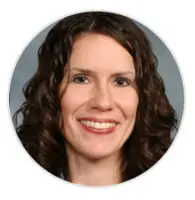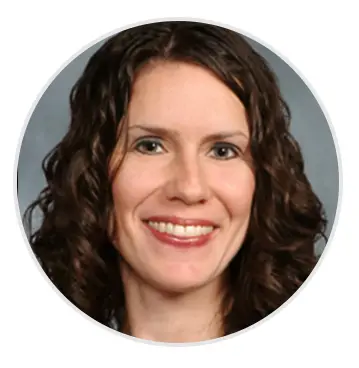Researcher Spotlight: Sarah Rutherford, MD
Weill Cornell Medicine

Dr. Rutherford is Assistant Professor at Weill Cornell Medicine. Her Lymphoma Clinical Research Mentoring Program (LCRMP) project seeks to use imaging to tailor treatment plans for diffuse large B-cell lymphoma (DLBCL) patients. Most DLBCL patients with advanced stage disease receive a combination therapy called R-CHOP [rituximab, cyclophosphamide, doxorubicin, vincristine, prednisone], given in six cycles every three weeks. Though effective for two-thirds of patients, R-CHOP is an intense therapy that regularly has side effects for patients. Dr. Rutherford and her collaborators would like to use the PET/CT (positron emission tomography or computerized tomography) scan regularly done after two R-CHOP treatments to gauge which patients are best responding to treatment. “We predict that a substantial number of patients have no evidence of lymphoma on the interim PET/CT and can be considered for a total of four rather than six R-CHOP treatments,” Dr. Rutherford says. “The ultimate goal is to decrease side effects that patients experience while maintaining excellent cure rates in DLBCL.”
Dr. Rutherford entered medical school at the University of Virginia planning to become a hematologist/oncologist, when her father was diagnosed with Hodgkin lymphoma in her first year. “As he neared the completion of chemotherapy, I had the opportunity to spend a summer working with [past LRF Scientific Advisory Board Chair] Dr. John Leonard at Weill Cornell. This was a defining moment in my training and led me to pursue a career focused on lymphoma.” After a residency at Thomas Jefferson University, Dr. Rutherford returned to Weill Cornell to complete her fellowship and ultimately join the faculty. She hopes to continue to pursue clinical research for aggressive lymphomas such as DLBCL as her career progresses. “My goals are to decrease therapy for patients with favorable characteristics and to use novel treatment strategies to improve responses in patients with more aggressive disease.”
Dr. Rutherford notes that her career goals will be aided by her participation in the LCRMP. “Under the guidance of the mentors of the LRF program, I will make appropriate adjustments to my initial proposal in order to solidify the foundation for a successful clinical trial,” she says, adding that she hopes to open her DLBCL trial at additional institutions represented by mentors and Scholars in her LCRMP class. “I will continue to work closely with colleagues at Weill Cornell and those I meet through LRF on development of clinical studies focusing on patients with aggressive B-cell lymphomas. The LCRMP is a key step that will aid in my success on this path.”


